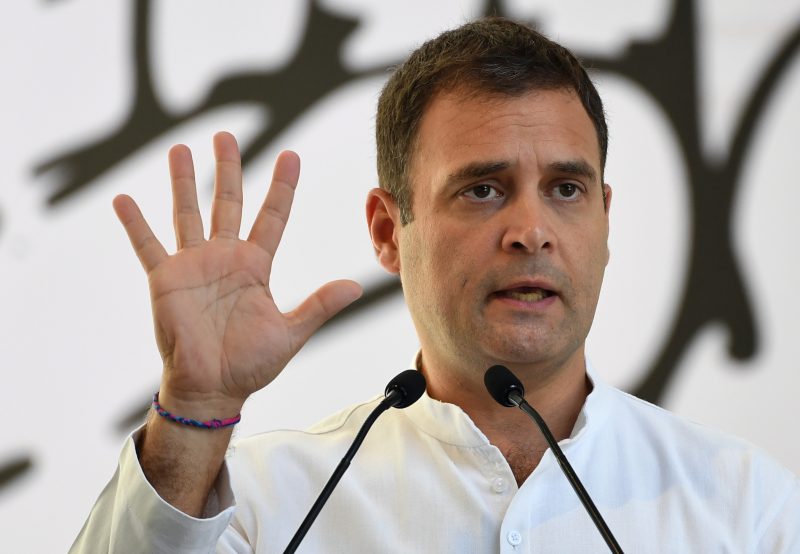Rahul, the Gandhi dynasty’s first failure
In contrast to the Hindu nationalist Modi, Rahul Gandhi has reached out to Muslim voters and stressed his secular credentials (PRAKASH SINGH)
New Delhi (AFP) – Being born a Gandhi is traditionally a guaranteed ticket to the Indian prime minister’s office, but the magic ran out for Rahul, the latest scion of the country’s most famous and powerful family.
The 49-year-old son, grandson and great-grandson of Indian prime ministers, resigned as head of Congress, the main opposition party, on Wednesday acknowledging a humiliating defeat by Narendra Modi, India’s new powerbroker.
Congress has appeared increasingly tired in the past decade while Gandhi has struggled to overcome the expectations of being the latest flag-bearer for India’s equivalent of the Kennedy clan in the United States. He has never overcome an image as a footloose princeling and political lightweight.
No relation to independence hero Mahatma Gandhi, Rahul was born in 1970 when his grandmother Indira Gandhi — daughter of India’s first prime minister, Jawaharlal Nehru — was premier.
In 1984, Indira was shot dead by her Sikh bodyguards and she was succeeded by her son Rajiv Gandhi, Rahul’s father. Rajiv was assassinated in 1991 by a Tamil suicide bomber when Rahul was 20.
Rahul was enrolled at Harvard but dropped out after a year, following his father’s death. He later graduated from Rollins College, Florida and in 1994 earned a master’s degree from Cambridge.
While in his 20s, he lived in London, where he worked at a management consultancy for a time.
His Italian-born mother Sonia Gandhi, widow of Rajiv, took charge of the Congress party in 1998 before handing over to her eldest child in 2017.
– ‘Empty suit’ –
Ten years earlier, in 2007, leaked US diplomatic cables described Rahul as an “empty suit” and “lightweight”, with little known about his political beliefs.
But by 2009, the US assessment was that Gandhi sounded like a “practiced politician who knew how to get his message across and… was comfortable with the nuts and bolts of party organization and vote counting”.
“He was precise and articulate and demonstrated a mastery that belied the image some have of Gandhi as a dilettante,” a leaked cable by senior US diplomat Peter Burleigh said.
While Sonia remained party leader, Rahul Gandhi was mastermind of the 2014 election campaign in which Modi’s Bharatiya Janata Party (BJP) crushed Congress. Afterwards he sought to revive the party.
At the end of a widely praised speech in parliament last year, Gandhi walked over to give an uncomfortable-looking Modi a surprise hug.
Gandhi tried to reach out to minority Muslim voters who felt alienated by Modi, and stressed his secular credentials.
Congress won three key state elections in December and it looked like Gandhi was a serious contender.
Election adverts show him hugging an emaciated peasant woman, while Gandhi’s leftist manifesto pledges to end abject poverty by 2030 and give cash transfers to 50 million families.
– ‘Not foolish’ –
But the BJP leader openly mocked Gandhi’s privileged upbringing as a “shahzada” (crown prince) at rallies across the country, comparing it to his own rise from being “a son of soil”.
Modi’s mud stuck, while Gandhi’s attack on Modi’s poor record on helping farmers, creating jobs or his supposed close ties to business tycoons had no impact.
Modi won their social media war, while Gandhi’s attempts to score points over allegations of dodgy dealings related to India’s purchase of Rafale jets from France also failed.
In his resignation letter Gandhi said he had no “hatred” for the BJP but “every living cell in my body instinctively resists their idea of India.”
He said Modi’s party had taken over and turned “the entire machinery of the Indian state” against the opposition.
While some analysts said Gandhi could yet return for a new try to get the key to the prime minister’s office, not everyone agreed with his view of the election.
Gandhi “appears to be clinging to the socialist ideas of his grandmother and doesn’t realise that people have changed, that even the poor have changed”, Parsa Venkateshwar Rao, a veteran journalist and political commentator, told AFP.
Disclaimer: Validity of the above story is for 7 Days from original date of publishing. Source: AFP.


